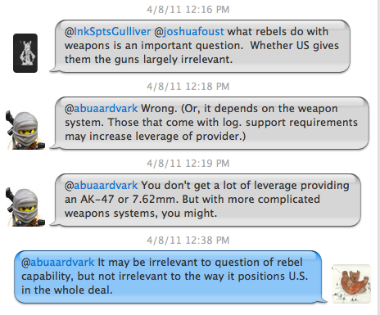Cluster Munitions Go Boom.
I have an article up at The Atlantic today on cluster munitions in Libya – how they got there, why that sucks, etc. I’m pretty pleased with how it came out, even as the writing process bore out the E.L. Doctorow quote, “Writing is like driving at night in the fog. You can only see as far as your headlights, but you can make the whole trip that way.” Had no idea where it was going, but I think I got somewhere interesting.
I struggled with a couple thoughts in writing this, most of which didn’t fit the story(ies) I was trying to tell. I’m just going to jot them down here and hopefully come back around to this soon:
- So what about smart bombs anyway? How well do these actually work at discriminating between various targets? Given that there is no way to protect all civilians in a combat zone, could they be a reasonable alternative, or do they just have some good PR going for them?
- In a more US-centric discussion, if cluster munitions are militarily necessary, and we recognize the need to protect civilians, and Secretary Gates has said he wants the US to be all-smart-bombs-all-the-time by 2018 … why can’t we sign the Convention on Cluster Munitions? The CCM allows for guided munitions and their development. The CCM does NOT prohibit us from working with countries that aren’t signatories (which would be a problem with Israel). Basically, I’m struggling with why we refusing to give up the stuff that makes our own jobs harder? Well, not my job, obviously, but, y’know, somebody’s.
- Stephanie Carvin of The Duck of Minerva raises the excellent point that advocates need better arguments. I wouldn’t call myself an advocate, but as some free advice to those who are: humanitarian pleas aren’t nearly as convincing as national security/national interest arguments. Find ways that the US benefits by banning cluster munitions that go beyond the “but limbless children!” point. Because that’s clearly not cutting it. Find evidence that signing international treaties in the past has bolstered the US’s international standing/national security (note: I haven’t done that research and have no idea if such evidence exists, but if it did, it would be more convincing than the limbless children)
- There’s a larger point to be made about Europe and the arms trade, but I’m still working that one through, and I don’t want to give away the ending before I’ve had time to think about it and do more research.
While I put these links into the Atlantic article, I’d like to suggest anybody interested in the subject read these two articles in particular:
- USAToday’s 2003 two part write-up of the US’s use of cluster bombs in Iraq is an excellent primer on the subject and provides a nuanced, non-hysterical exploration of the issues around their use.
- Soeren Kern’s blog post, “Why Is (Pacifist) Spain Selling Cluster Bombs to Libya?”. Not sure if this one made it into the Atlantic piece, but it should have, since this is where I had some a-ha moments.





